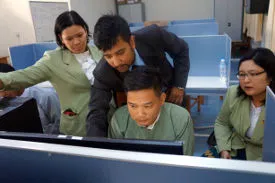
Following the operationalization of the Electoral Risk Management Unit (ERM Unit) of the Union Election Commission (UEC) back in August, International IDEA has continued assisting the development of monthly risk reports. The ERM Unit has produced two of these reports in August and September.
In line with the ERM Unit operational plan, the data collected for these reports focus on operational risks. The third questionnaire, currently being reported to the ERM Unit, includes questions related to matters as various as transportation issues, election-related clashes, level of preparation of polling stations and observer accreditation requests.
Sustaining the efforts required to receive and process reports from 14 State and Region sub-commissions with data from 330 township sub-commissions, and analyze them, has required IDEA to increase its level of support by deploying a full-time national staff to support the UEC, as well as to frequently encourage the UEC to dedicate the appropriate level of resources, including time and staffing, to the ERM process. The Myanmar police force takes part at specific points of the ERM Unit work, following UEC’s agreement.
Since August International IDEA's support has also aimed at upgrading the capacities of the ERM Unit, from processing data and producing ERM maps, to reach the capacity to autonomously analyze these maps and adapt the mitigation and prevention recommendations to the Myanmar context, in order to propose to UEC leadership advanced reports allowing fast decision-making. While this skill building process is still a job in progress, the reports of the unit have started showing significant improvement.
Currently, International IDEA is also working on planning a special data collection process for the pre-electoral week, in a context where the sub-commissions will have less time to dedicate to ERM, with the objective to release a special election day ERM report soon after the elections.
ERM preparations have also had a positive impact on the police force’s level of awareness of electoral risks, that has enabled it to play a key role in the Elections Security Monitoring Committees (ESMCs) recently established by the government. We are receiving positive reports from other international partners supporting those efforts.
“We have consistently observed that the ERM training that you all provided to many has really impacted their preparations and understanding of risks,” says one senior staff of an international organization working with the Myanmar police force to prepare the elections.
“I have been quite impressed with many of their reference documents in which the ERM influence is quite evident and a testament to your efforts.”



